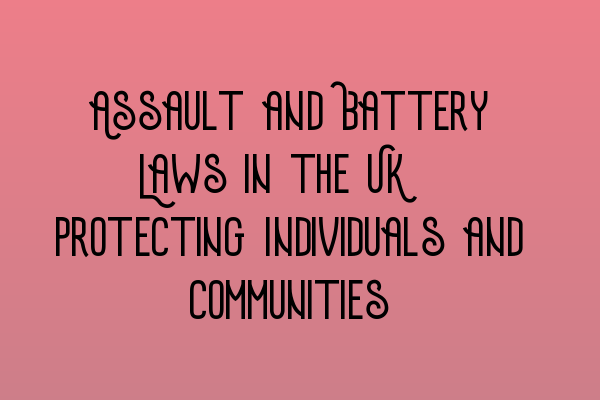Assault and Battery Laws in the UK: Protecting Individuals and Communities
Assault and battery are serious offenses that can cause harm, fear, and distress to individuals and communities. Understanding the laws surrounding these offenses is crucial for protecting the well-being and safety of all members of society.
What is Assault?
Assault is an intentional act that causes another person to fear the imminent use of unlawful force. It can involve physical contact or the mere threat of violence. In the UK, assault is a criminal offense punishable under the Assault Act 1988.
There are three main types of assault recognized under UK law:
- Common Assault: This is the least serious form of assault, often referred to as a “minor assault.” It involves intentionally causing another person to fear immediate violence. Common assault carries a maximum penalty of six months’ imprisonment.
- Actual Bodily Harm (ABH): This refers to an assault resulting in less severe injuries that cause physical harm or pain to the victim. ABH carries a maximum penalty of five years’ imprisonment.
- Grievous Bodily Harm (GBH): GBH involves a more severe form of physical harm caused intentionally or recklessly. It carries a maximum penalty of life imprisonment.
It is essential to note that the severity of the assault and the level of harm caused will determine the charges and potential penalties.
Defenses for Assault Charges
If you or someone you know is facing assault charges, it is crucial to understand the possible defenses. Some common defenses include:
- Self-Defense: If the accused acted in self-defense to protect themselves from harm or imminent danger, it may be a valid defense.
- Lack of Intent: Assault requires intent. If it can be proven that there was no intention to cause harm or fear, it could be a valid defense.
- Consent: In certain situations, if the victim consented to the physical contact or action that led to the assault, it may be a defense.
- Mistaken Identity: If there is reasonable doubt regarding the identity of the assailant, it can be a valid defense.
It is important to consult with a qualified criminal defense solicitor to assess the specific circumstances and determine the best defense strategy.
Battery: A Related Offense
Battery, often linked with assault, involves the intentional and unlawful application of force to another person. It is a separate offense under UK law, falling under the Criminal Justice Act 1988.
While the definitions of assault and battery may appear similar, assault relates to the fear of imminent violence, while battery deals with the actual physical contact or application of force.
Penalties and Consequences
Assault and battery charges can have severe legal consequences. Convictions can lead to imprisonment, fines, community service, restraining orders, and a criminal record, which can affect future employment prospects and personal relationships.
It is crucial to seek legal representation if facing assault or battery charges. A skilled criminal defense solicitor can help navigate the legal process, build a strong defense, and ensure fair treatment.
Protecting Individuals and Communities
Assault and battery are crimes that can deeply impact individuals and communities, causing physical and emotional harm. It is our collective responsibility to prioritize safety and protect vulnerable members of society.
If you want to learn more about the legal field and prepare for your SQE exams, be sure to check out our related articles:
- SQE 1 Practice Exam Questions
- SQE 1 Practice Mocks FLK1 FLK2
- SQE 2 Preparation Courses
- SQE 1 Preparation Courses
- SRA SQE Exam Dates
At SQE Criminal Law & Practice Law UK, we are dedicated to providing comprehensive legal resources and professional guidance to individuals pursuing a career in law.
